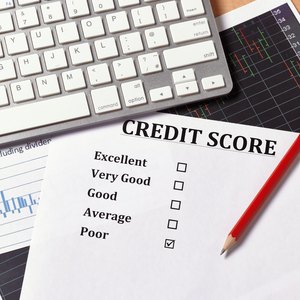
Various factors go into making up your credit score – a single number that indicates how well you handle credit. It’s based on such factors as making payments on time, your debt-to-credit ratio, what kind of credit you have and how long you've had it. You can affect your score by your actions, such as making a new purchase or paying off an old debt. The effect of paying off a repossession depends on your unique credit situation.
Tips
Paying off a repossession can help your credit score since it reduces debt owed, and you may be able to get the item removed from your credit report. However, the significance of impact on your score depends on your credit history and profile and whether you take a settlement.
Credit Report Negatives
Negative items on your credit report drop your overall credit score, but how much it drops depends on things such as how many accounts you have, the dollar amount of the negative items, your overall credit status and other factors. Multiple negative items typically indicate a pattern of poor credit management and will drop your score more than one or two isolated incidents. Repossession is a serious event, but if everything else on your credit report remains stable, you may be able to recover relatively quickly.
Payoff Effect on Debt Ratio
An important part of your credit score is how much debt you have compared with your available credit. When you pay off a repossession, it reduces the amount you owe to your creditors. This has a positive effect on your credit and will help to raise your score. If you aren't able to pay it all off at once, make arrangements to make payments on the balance. Making the new payments as agreed on can help to boost your score by showing a recent history of on-time payments along with reducing your debt.
Paying off a Repossession
If you've had a repossession and then pay it off, make sure the lender reports the debt as satisfied and paid in full. In some cases, you may be able to get the lender to remove the account from your credit report, which can have an immediate positive impact on your score. If the lender agrees to remove it, make sure to get it in writing before you make the payment. If the lender doesn't agree, the debt will remain on your account for seven years, even if it's paid off.
Settlements and Your Credit Score
If you aren't able to pay off the repossession in full, you may be able to reach a settlement with the lender, often a single lump sum payment for half or less of the remaining debt. The lender writes off the rest and stops all further collection action. Be careful when settling, because it can backfire. Your credit report will reflect that the account was settled for less than what was due, which is likely to keep your credit score low, and you may owe taxes on the amount you didn't pay.
References
- MyFICO: Collections - How to Manage Them and What They Do to Your Credit.
- MyFICO: What’s in My FICO Score
- Bankrate: Credit Scores and Car Repossessions
- CreditKarma: Car Repossession – Will It Affect My Credit?
- Fair Isaac Corporation. "What is a Credit Score?" Accessed Oct. 31, 2020.
- Fair Isaac Corporation. "How Credit Actions Impact FICO Scores." Accessed Oct. 31, 2020.
- Credit Sesame. "Free Credit Score." Accessed Oct. 31, 2020.
- Credit Karma. "How Credit Karma Works." Accessed Oct. 31, 2020.
- Credit Karma. "Credit Score Simulator." Accessed Oct. 31, 2020.
- Fair Isaac Corporation. "FICO Score—How It Works." Accessed Oct. 31, 2020.
- Experian. "What Is a Rapid Rescore? Is It Something I Should Consider?" Accessed Oct. 31, 2020.
- Fair Isaac Corporation. "Introducing UltraFICO Score." Accessed Oct. 31, 2020.

